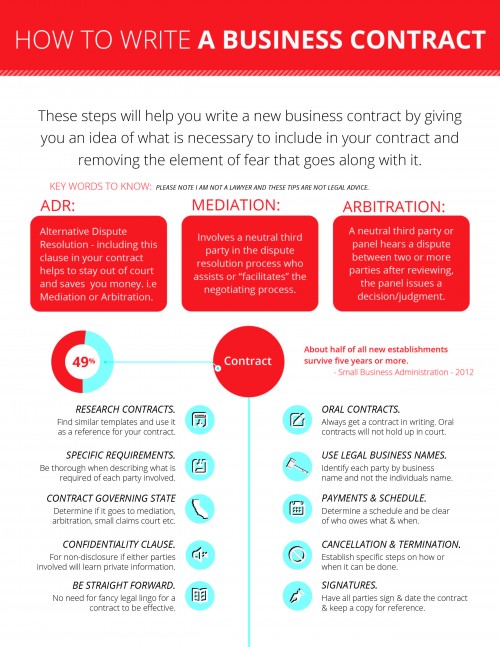Please note before I begin that I am not a lawyer and these tips on how to write a business contract are not legal advice. Download PDF file of image below here.
Are you just getting your business started and want to avoid spending thousands of dollars on a lawyer but are afraid to write legalese yourself? These steps on how to write a business contract should help remove the element of fear and help you better understand what do. It would be smart to consult a lawyer to review your contract once you are done. Many of the contracts that my business uses have been written by myself based off of templates I find online then customized and fleshed out with what I want. I have an attorney friend who will generally review my contracts after I have written them to make sure they are free of errors and cover my bases. Below are the essentials of writing a good business contract:
- ALWAYS put all terms of an agreement in writing. Oral promises are worthless in court because though they may be legally binding they are often difficult to prove that they actually exist. I actually have run into a number of situations in which I made a written agreement with someone and then we couldn’t remember the terms later so the written agreement saved us the trouble of an expensive legal battle – it was a great reminder of what was needed.
- Use correct legal names. Identify the parties to the contract by their full legal business names (LLC or corporation) not by the individuals signing the contracts name. Make sure that whoever is signing the contract with you has the right to sign on behalf of the corporation. You need to make sure that this is accurate so that if the agreement goes south you have legal rights over that entity.
- Be direct. You don’t need to use a lot of fancy legal lingo for a contract to be effective. Be simple and direct in pointing out what needs to be included. Try to think of all relevant factors and situations that could come up and make sure those are addressed. Keep things simple with clear numbered paragraph headings with nice titles.
- Don’t forget anything relevant. Judges will only enforce what is included in a contract, not what you discussed orally leading up to signing the contract. Make sure that everything is included. If there are charts, graphs, videos or other relevant information be sure to include them as “Exhibit A”, “Exhibit B”, etc. If you do end up forgetting something, create a short written amendment to add those details onto the contract.
- Confidentiality. Be sure to include a clause for non-disclosure if one or both of the businesses involved will learn private information about the other business.
- Select a state to govern the contract. Pick a state that will be in charge of arbitrating a disputed contract. Generally you will want this to be the state you are in. You also should include what legal steps each party should take when the contract is in dispute – does it go to mediation, arbitration, small claims court, or regular court? Deciding this stuff up front will avoid lots of legal red tape battles later if the contract does not go as planned.
- Include all information and details. Be sure to thoroughly explain the rights and duties of all the parties involved. Don’t forget the who, how, when, where or anything else. Remember that anything not in the contract will not be enforceable in court.
- Specify exactly how the contract can be terminated or cancelled. Frequently one party or another will want to cancel or terminate a business contract. If they do choose to do so, they will need a set route established on how or when it can be done. Many times a cancellation will require one business to pay the other a fee or to perform a certain action. Another example might be that if one party misses many deadlines the other party can cancel the contract.
- Be very clear when money is involved. Be specific on who owes what to whom and when. Include what the penalties are for late payment. If installment payments are made be specific as to what dates they will be made on. If work needs to be done to the satisfaction of one party, be very specific on what exactly needs to be done to satisfy that party. Also include method of payment – credit card, cash, cashier’s check, etc.
- Signatures. Don’t forget to have both parties sign and date and obtain copies of the contract!
- Find template contracts to start from. If you are writing up a new contract type for the first time you can often simply Google search for it and you will turn up many other people’s similar contracts. I have put together my own little Frankenstein’s this way and then sent them to my attorney for a quick review and approval.
